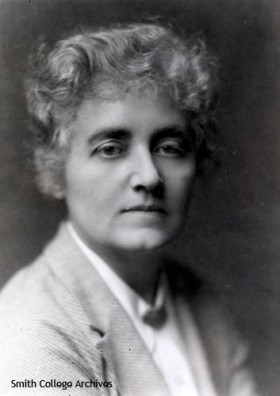(1887-1993) produced a great many books in her career that secured her place in academic circles. Her books about her recollections of Maine provide readers with vivid images of life on the rural coast in the years before electricity and indoor bathrooms brought modernity to Maine. Because of her writing, modern readers can access a time that seems idyllic in contrast to today’s hectic lifestyle.
Mary Ellen Chase was born on February 24, 1887 in Blue Hill. Her strict father was an attorney; her mother, a homemaker who encouraged reading and the playing of word games. Her father’s mother, who lived with them for years, told stories of her ten years at sea with her husband who had been a sea captain.
At the age of ten, Mary Ellen met Sarah Orne Jewett, one of Maine’s most famous authors, and later recalled Jewett’s great kindness and encouragement. After graduating from Blue Hill Academy, she earned her B.A. from the University of Maine in Orono in 1909. Mary Ellen continued her education at the University of Minnesota, where she earned an M.A. and Ph.D. In between she taught in a one-room school in Buck’s Harbor, Maine and in a coeducational boarding school in Chicago, Illinois and a public school in Montana.
Mary Ellen found her niche in academia but she never abandoned her passion for fiction writing. In 1926 she took an English professorship at Smith College. Thirty years at Smith were recognized when the school named a dormitory building in her honor. She spent summers at her home, “Windswept” in Steuben from 1941 until 1955, where she wrote her best selling novel by that name.
But Mary Ellen did not seclude herself in colleges and universities. She published over 30 books, ranging from fiction to biography to critical Biblical scholarship. Her Maine works will always have a place in Maine’s literary collection.
Mary Ellen included Maine images and characters in many of her fiction books, but by her own declaration, the three most inspired by and true to Maine were Mary Peters, published in 1934, Silas Crockett in 1935, and The Edge of Darkness in 1957. A Goodly Heritage (1932), and A Goodly Fellowship (1939) are about her childhood and how she became a teacher.
She was awarded honorary degrees at the University of Maine, Bowdoin College, Colby College, Smith College, and Northeastern. In 1956 the Women’s National Book Association awarded her the Constance Lindsay Skinner Award.
Mary Ellen Chase died in Northampton Massachusetts on July 28, 1973 at the age of 86.
Additional resources
Chase, Evelyn Hyman. Feminist convert: A Portrait of Mary Ellen Chase. Santa Barbara. J. Daniel, 1988.
Kates, Elizabeth “Mary Ellen Chase Biographical Note” Five College Archives and Manuscript Collection, Mortimer Rare Book Room, William Allan Neilson Library, Smith College. http://www.smith.edu/libraries/libs/rarebook/
“Mary Ellen Chase, professor English, May, 1933.” Smith College Archives. [Photo] (accessed June 3, 2008) http://www.smith.edu/library/libs/archives/gallery/images/biography/sc_chase.jpg
Squire, Elienne. A Lantern in the Wind: The Life of Mary Ellen Chase. Santa Barbara. Fithian Press. 1995.
Maine Women Writers Collection, University of New England.
Westbrook, Perry D. Mary Ellen Chase. New York. Twayne Publishers. 1965.
Contributed by Karen L. Sherlock, Edgecomb, Maine, 2008.



Fact check: her house “Windswept” where the book was written is on Petit Manan Peninsula, Steuben, ME
Thank you for your correction.